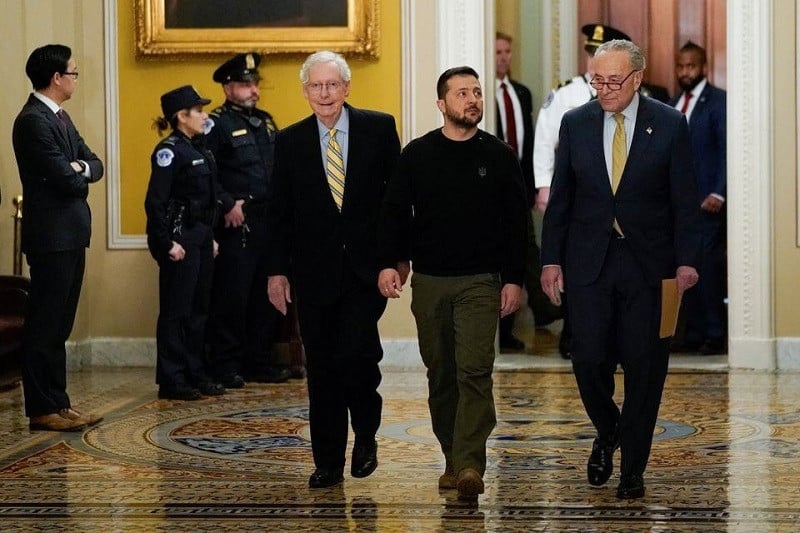(Reuters) – Ukrainian President Volodymyr Zelenskiy met with U.S. lawmakers on Capitol Hill on Tuesday to make a last-ditch plea to keep military support flowing as he battles Russia, though he is likely to face a skeptical reception from many Republicans.
Wearing a black shirt and olive drab trousers, Zelenskiy was met with sustained applause as he arrived for a closed-door meeting with U.S. senators. He was accompanied by Chuck Schumer, the chamber’s top Democrat, and Mitch McConnell, the top Republican.
Heading into winter, with tens of thousands of Ukrainians dead, a yawning budget deficit and Russian advances in the east, Zelenskiy is asking Washington to provide badly needed military and humanitarian aid.
Zelenskiy, on the second day of his trip to Washington, is due to meet privately on Tuesday with House of Representatives Speaker Mike Johnson.
Zelenskiy will then head to the White House, where he and President Joe Biden will hold a news conference at 4:15 p.m. local time (2115 GMT).
The White House told Congress on Dec. 4 the government will no longer have funding to provide more weapons for Ukraine after the end of the year. Congress has approved more than $110 billion for Ukraine since Russia’s February 2022 invasion but no new funds since Republicans took over the House from Democrats in January.
Some Republicans, particularly those with the closest ties to former President Donald Trump, oppose more Ukraine aid, and are asking about the war aims and how U.S. money is being spent.
Johnson, a Republican, has said lawmakers need more detail on the administration’s objectives in Ukraine. His fellow Republicans have said any further aid must be paired with changes to immigration policy — an exceptionally divisive issue in U.S. politics.
Johnson said on Tuesday he was waiting for the White House to respond. “There’s no return volley,” he told conservative radio host Hugh Hewitt. He also demanded the Democratic president get directly involved in negotiations on the bill, saying that was “far, far overdue.”
“If there’s anyone inspired by unresolved issues on Capitol Hill, it’s just (Russian President Vladimir) Putin and his sick clique,” Zelenskiy said at a speech in Washington on Monday to a U.S. military audience.
Newly declassified U.S. intelligence shows that “Russia seems to believe that a military deadlock through the winter will drain Western support for Ukraine” and ultimately give Russia the advantage, said Adrienne Watson, spokesperson for the White House National Security Council.
Ukraine is having success stopping Russian forces but Putin is continuing to order his troops forward despite heavy losses of troops and equipment since October, she added.
There are just three days before Congress recesses for the year on Friday, and Republicans in the House of Representatives have until now refused to pass a spending package bill that contains $61.4 billion in Ukraine aid without fiercely disputed changes to U.S. immigration.
Senate Republicans expressed dwindling hopes they can reach an immigration deal with Democrats and pass the supplemental package this week.
“I’m becoming increasingly pessimistic,” Senator Susan Collins, the top Republican on spending, told reporters.
Biden has cast the situation in stark terms, saying “history is going to judge harshly those who turn their back on freedom’s cause.”
Ultimately, U.S. troops could be forced to fight Russia, Biden and others warn, if an unchecked Putin invades a European ally covered by NATO’s mutual defense commitments.
Bolstered by billions of dollars in U.S. arms, humanitarian aid and intelligence, Ukraine was able to fend off Russia’s initial attempt to sweep the country. But Kyiv failed to break through Russian defensive lines in a major counteroffensive push this year and Russia is now on the offensive in the east.
Both the war and immigration issues are expected to be lightning-rod issues ahead of the 2024 U.S. presidential and congressional elections. Trump and Biden are both seeking the presidency.
About 41% of U.S. adults polled by Reuters/Ipsos last month backed sending weapons to Ukraine, compared to 32% who were opposed and the rest unsure.



